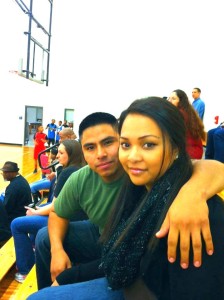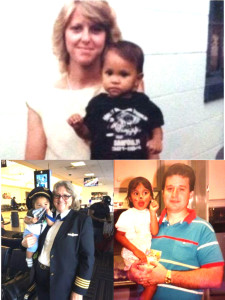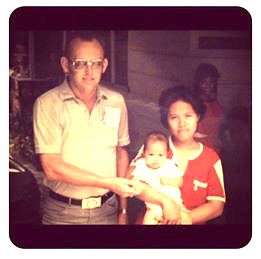‘Help me find Mother’

Amanda Lantz with her adoptive brother from Peru. CONTRIBUTED
Ken and Patricia Lantz looked lovingly at the four-month-old baby. Ken was a pilot was stationed in Okinawa, Japan. His wife’s uncle brought out the documents for the Lantz couple’s signature. The document showed that the baby was born on April 22, 1986 in Sta. Trinidad, Angeles City, Pampanga to Nerissa C. Tano, 18 years old, and to unidentified American. The Lantz couple named her Amanda Lantz.
The Lantzes brought the eight-month-old baby Amanda to the United States, in Miami, Florida. When the Lantzes divorced, Amanda lived in Georgia, in a predominantly white town where she bore the burden of being “dark.”
‘My best friend was a Filipino’
Amanda was eight when Patricia Lantz died of leukemia. She moved to Texas with her father, Ken, who was by then married to Mary, also a pilot.
In third grade, Amanda met Lilac, a Filipino immigrant. Lilac’s parents always welcomed her for sleepovers and family gatherings. Although Amanda felt a sense of connection, she also felt “weird” about the food; so the family kept a small stock of “American food” for her.
“I loved being with Lilac’s family, but I oftentimes felt jealous of her,” Amanda says.
Amanda met a lot of Asians in school, sparking her interest to learn about Asia. But the Filiipino culture struck her most. Although Lilac’s family moved from Texas when they were in the sixth grade, Amanda’s interest in the Philippines intensified in a way she could not understand.
“I wanted to know about it when I was young, because a part of me knew I was different. I spent a lot of my life saying I was adopted just so people would stop asking why my parents are white and I’m dark,” Amanda recalls.
‘I have Filipino blood’
It took a long time before Amanda confirmed her intuition that she was indeed different.
She was 21 years old when her parents told her about her adoption. Shocked was her initial reaction, but she never blamed her adoptive parents; instead she asked about the circumstances that led her to them.
Amanda found out that she was first adopted by Patricia Lantz’s uncle who was then stationed in Clark Air Base in the Philippines. Later, Amanda was told that the uncle was too old to raise another baby; so she was brought to Okinawa to be adopted again by Ken and Patricia.

Patricia Lantz and Amanda (top). Left : Mary Lantz and Amanda’s child. Right: Ken Lantz and Amanda. CONTRIBUTED
“My dad told me that my biological mother worked in a club. They said ‘Nerissa’ gave me up because she was too young and wanted me to have a better life,” Amanda explains.
Amanda tried to forget her biological parents, especially her mother, to no avail.
“I started looking for her because I need a closure to move on,” says Amanda.
Amanda and the Lantz couple never knew her biological father.
“I would like to meet my American father, but I am not interested in having a relationship with him. I have a father,” Amanda says.
Amanda initially wanted to travel to Angeles City to show Nerissa’s picture to people, but she knew it would take time. Browsing Facebook, she discovered the “Amerasian Children Looking for Their American GI Fathers Facebook Group.”
The group is composed of both American fathers and children looking to establish blood relationships through DNA testing and documents such as birth certificates and photos.
She found out that the American bases in the Philippines created thousands of half-American children who, like her, are trying to find their fathers and mothers, not only for support but also for recognition by the American government.
Subic Naval Base in Olongapo and Clark Air Base in Angeles City were closed due to the Mt. Pinatubo eruption on June 15, 1991. Prior to the Mt. Pinatubo eruption, several groups including the Philippine Senate rejected the Military Bases Agreement of 1947 that could have extended the presence of the bases in the Philippines.

Amanda’s birth mother, Nerissa C. Tano, with an unidentified Caucasian man with Amanda as a baby. CONTRIBUTED
“I recently joined the group and posted my story. I was referred to [this writer] so someone could write my story,” Amanda explains.
Raised in a loving multicultural family
Amanda feels fortunate that she was raised well by her adoptive parents. She also has a brother who was adopted from an orphanage in Peru. Despite that, she admits her envy of people who were raised by their birth parents.
“I’ve had a good life, I love my parents and family dearly. But I will always have this longing to know my birth family,” Amanda says.
“People can have kids unintentionally for various reasons, but when you’re adopted, it’s fo the purest form of sacrificial love because you were chosen just the way you are,” she emphasizes.
If Nerissa C. Tano could hear her, Amanda wants to ask her:
“Did you ever think of me? Or wonder where I was or how I was doing? Why did you do a closed adoption and disappear? It has been almost impossible to find you and even if we don’t begin a relationship out of this, I want you to know that I’ve thought of you this whole time.”
Amanda continues:
“Please come forward. I don’t expect to pick up and have a relationship after all these years. I just want to talk to you, possibly meet you, and close this chapter of my life.”

